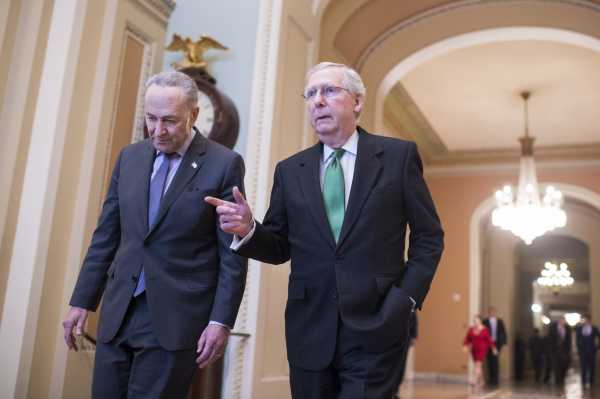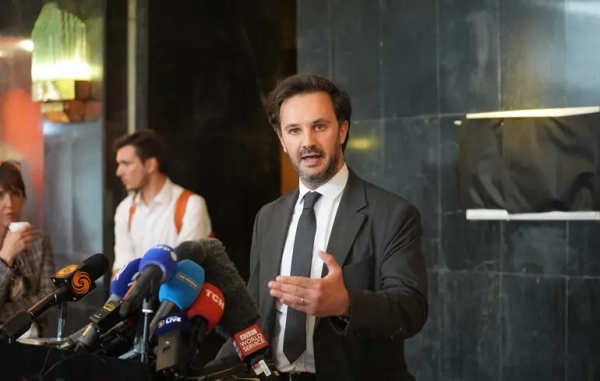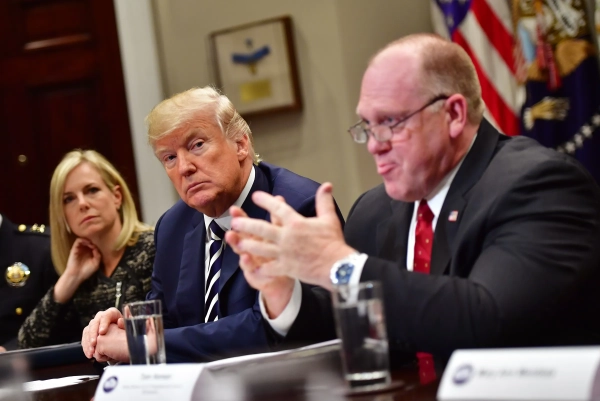
The dream looks dead.
The Senate failed Thursday afternoon to advance any of the four immigration bills that were put on the floor for a vote, unable to make any movement toward protecting young people brought illegally to the United States as children.
Senate Majority Leader Mitch McConnell allowed debate on several possible fixes for those covered by the Deferred Action for Childhood Arrivals program, which includes about 700,000 people who face uncertainty about their deportation protections. President Trump has said he would rescind those protections in early March, putting the onus on Congress to come up with a permanent solution. Each and every one of those possible fixes came up short in a series of Thursday afternoon votes.
It leaves the Senate, after a government shutdown and month of negotiations, with no clear path forward on immigration, nearly six months after Trump said he would end the DACA program without congressional action.
Trump played his part in Thursday’s showdown: At midday on Thursday, the White House issued a veto threat against the bipartisan bill that seemed to have the best shot of winning the 60 votes needed — meaning even if the Senate had gotten enough support for the plan, Trump seemed unlikely to sign it.
Four immigration bills were put on the Senate floor, and four bills failed
The Senate voted on four immigration bills on Thursday afternoon; they needed 60 votes to advance. Each of the bills, from the most conservative to the most liberal, failed.
First up was a plan by Sens. Chris Coons (D-DE) and John McCain (R-AZ). The Coons-McCain bill would have:
- Provided a path to citizenship for 1.8 million undocumented immigrants who came to the country as children
- Offered no money for Trump’s border wall, though it did include some border security measures
It failed 52 to 47, with Democrats almost united in favor and Republicans mostly voting against it.
What it means: The failure of the Coons-McCain plan underlined that with the Republicans controlling every lever of power in Washington, a bill without any funding for Trump’s infamous border wall is a nonstarter.
The second vote, on an amendment from Sen. Pat Toomey (R-PA), did not actually address DACA or border security. The Toomey amendment would have penalized so-called sanctuary cities that refuse to enforce federal immigration policy, by withholding federal funding from those municipalities. The issue has been a fixation for Trump and some of the conservative hardliners in Congress.
It failed 54 to 45. Republicans and a few Democrats supported it, but most Democrats were opposed.
What it means: Sanctuary cities are a deeply partisan issue, so it’s no surprise this failed to win broad bipartisan support. Republicans likely wanted to get vulnerable Democrats up for reelection in 2018 in states that Trump won on the record on the issue.
Third: The so-called Common Sense Caucus, a large bipartisan group led by Sen. Susan Collins (R-ME), released its own outline. The plan had gained the endorsement of Democratic leadership and was technically sponsored by Minority Leader Chuck Schumer. The “Common Sense” plan would have:
- Provided a path to citizenship for 1.8 million undocumented immigrants who came to the country as children
- Offered $25 billion for border security
- Prevented DACA recipients from sponsoring their parents for legal status
It failed 54 to 45. Democrats almost unanimously backed the plan, along with eight Republicans. But the rest of the GOP conference and a handful of Democrats blocked the bill.
What it means: The “Common Sense” plan seemed like it had the best chance of winning 60 votes, but the White House threatened to veto it, and Republicans who had previously been more moderate on immigration refused to support it. This is the most damning vote on Thursday: No other bill seemed viable, and yet even this plan, after the White House’s intervention and amid intransigence from conservatives, could not win the necessary support.
For the fourth and final vote the White House got a vote on its demands, which have been mirrored in legislation from Grassley. The Grassley bill would have:
- Provided a path to citizenship for 1.8 million undocumented immigrants who came to the country as children
- Offered $25 billion to fund a southern border wall
- Substantially curtailed family immigration and eliminated the diversity visa lottery program in such a way that would gut the legal immigration system
It failed, 39 to 60. Democrats opposed the bill en masse, joined by a notable number of Republicans, while most of the GOP conference and a couple Democrats supported it.
What it means: Trump’s preferred immigration plan appears to be unviable in the Senate.
Legal immigration is now the real hurdle to a Senate deal on DACA
Even with the failed votes, there was little disagreement among the various plans on two major issues: the DACA recipients themselves and border security funding.
Every major plan — from the Grassley/Trump proposal to McCain-Coons — would have provided a path to citizenship for young people in the United States who are eligible for DACA. An estimated 1.3 to 1.8 million people who had been brought to the country illegally as children would have received protections under that provision.
On border security, the disagreement was lesser — Democrats weren’t eager to give Trump his wall, but they did appear willing to fund it to save DACA. The White House wanted $25 billion, and the Grassley bill gave it to them. So did the latest bipartisan “Common Sense” compromise.
The real disagreement, then, came down to legal immigration. The White House wanted substantial legal immigration cuts through changes to family-based migration and the diversity visa program. Those provisions were incorporated into the Grassley plan, but it had trouble mustering even universal Republican support.
Now, senators will return to their home states, having done nothing — yet again — to solve the DACA crisis.
Sourse: vox.com






